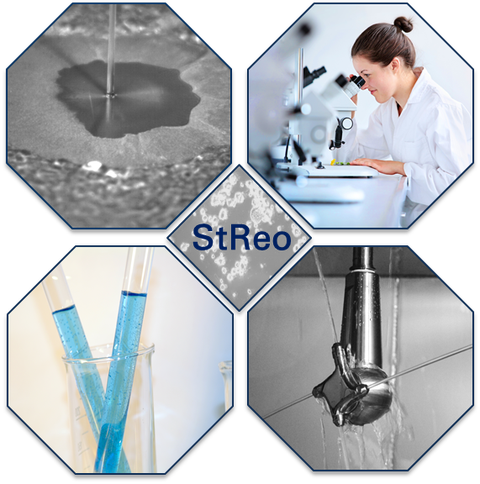Identification of physical-chemical properties of soils for structure-based cleaning optimisation in the food industry
Over-dimensioning and excessive settings of the operating parameters of common wet-cleaning systems for tank or vessel cleaning (cleaning-in-place) are accepted to ensure hygienic requirements in the food industry. This leads to a reduction in productivity and an environmentally harmful waste of water, chemicals and energy. A significant savings potential and a related competitive advantage can be achieved by optimising the cleaning process with a priori knowledge about the cleaning behaviour of the respective deposit.
The focus of the research project is the targeted optimisation of the efficiency of cleaning processes based on knowledge about the cause-effect relationships of physical-chemical properties and cleaning behaviour of typical food deposits. The aim is to identify cleaning-relevant chemical structures at the example of starches, with which a priori statements regarding efficient cleaning methods, operating parameters and cleaning fluid can be made. A second research focus is on a user-specific and cost-based efficiency analysis of the used cleaning systems.
A characterisation of cleaning-relevant physical-chemical properties of native starches with different botanical origin (for example, proportions of amylose and amylopectin, swelling behaviour) and of starches with targeted variations of chemical structures will be done. In cleaning studies the most important cleaning methods for immersed and non-immersed systems (pipe, spray and jet cleaning) are represented on a pilot scale and the expenses for cleaning are recorded in the form of cleaning fluid and energy consumption. With multivariate statistics the data of the soil characterisation and the cleaning studies are linked and significant influences of the soil structure on the cleaning behaviour as well as interactions are identified and quantified.
As a result, the knowledge base for cleaning-relevant physical-chemical properties of starches is significantly extended and a soil-structure-based optimisation of cleaning processes is enabled, where the selection, design and parameterisation of the cleaning method is taken into account. Perspectively, the methods and results can be applied to further soils. In this way, economic and ecological saving potentials are released and another step towards needs-based cleaning is taken.
In the subsequent project Identification of physical-chemical properties of soils for structure-based cleaning optimisation in the food industry 2 - StReo 2, the applied methods will be transferred to complexly composed soils consisting of different carbohydrates and a whey protein.
Project funding:
This research project is supported by the Industrievereinigung für Lebensmitteltechnologie und Verpackung e. V. (IVLV), the Arbeitsgemeinschaft industrieller Forschungsvereinigungen “Otto von Guericke” e. V. (AiF) and the Federal Ministry of Economic Affairs and Energy (IGF 19640 BR).
Project duration: 08.2017 – 01.2020
Project management and contact:
Project leader: Prof. Majschak
Project manager: Sebastian Kricke
 © Clemens Troll
© Clemens Troll
Cleaning Technologies
NameDipl.-Ing. Sebastian Kricke
Send encrypted email via the SecureMail portal (for TUD external users only).
Cooperation partner:
Technische Universität Dresden, Institute of Natural Materials Technology, Chair of Food Technology


